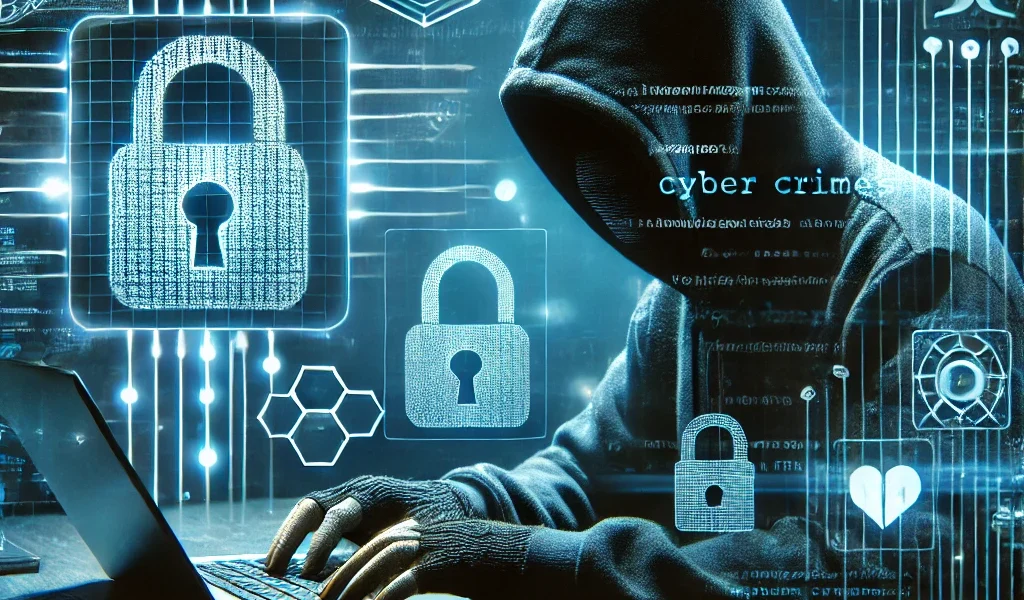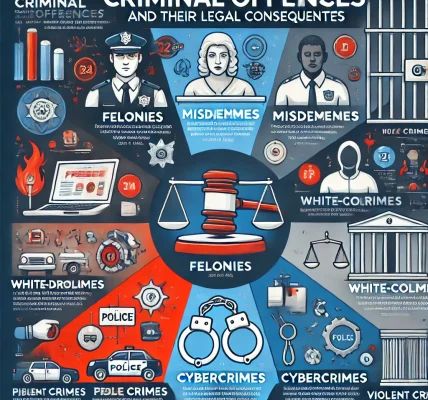Introduction
In today’s digital world, cyber crimes have become a growing concern for individuals, businesses, and governments. Cyber crimes involve criminal activities carried out using computers, networks, or the internet. As technology advances, so do the methods used by cybercriminals, making it essential to understand these offenses and the legal consequences attached to them.
This article provides a comprehensive guide to cyber crimes, types of digital offenses, laws governing cyber crimes, and how individuals and organizations can protect themselves from cyber threats.
1. What Are Cyber Crimes?
Cyber crimes refer to illegal activities conducted through digital means, including hacking, fraud, identity theft, and cyberbullying. These crimes can cause financial losses, data breaches, and reputational damage to victims. Law enforcement agencies and cybersecurity professionals work together to combat these offenses and ensure digital safety.
Key Characteristics of Cyber Crimes:
- Conducted through digital devices or networks.
- Target individuals, organizations, or governments.
- Involve illegal access, data manipulation, or financial fraud.
- Can have cross-border implications.
2. Common Types of Cyber Crimes
Cyber crimes encompass a wide range of digital offenses, including:
a) Hacking
Hacking involves unauthorized access to a computer system or network. Hackers exploit vulnerabilities to steal sensitive data, disrupt operations, or cause damage.
b) Identity Theft
Cybercriminals steal personal information, such as credit card details and social security numbers, to commit fraud or impersonate victims.
c) Phishing
Phishing scams use deceptive emails or websites to trick users into providing confidential information like passwords and banking details.
d) Cyberbullying
Cyberbullying includes online harassment, threats, or abusive behavior intended to harm or intimidate individuals.
e) Online Fraud
This includes scams like lottery fraud, fake job offers, and Ponzi schemes designed to steal money from unsuspecting victims.
f) Ransomware Attacks
Cybercriminals use ransomware to encrypt a victim’s files and demand payment for decryption.
g) Cyberstalking
Cyberstalking involves persistent online harassment, tracking, or monitoring of an individual without their consent.
h) Software Piracy
Unauthorized distribution or use of copyrighted software without proper licensing is considered cybercrime.
3. Cyber Crime Laws and Regulations
Governments worldwide have implemented laws to combat cyber crimes and protect digital users. Some of the key laws and regulations include:
a) The Computer Fraud and Abuse Act (CFAA) – USA
This law criminalizes unauthorized access to computer systems, hacking, and cyber fraud.
b) The General Data Protection Regulation (GDPR) – EU
GDPR regulates data privacy and security, ensuring that organizations protect personal data from breaches.
c) The Information Technology Act (IT Act) – India
India’s IT Act addresses cyber crimes like hacking, identity theft, and online fraud, imposing penalties on offenders.
d) The Cybercrime Prevention Act – Philippines
This law penalizes cyber offenses such as identity theft, hacking, and cybersex-related crimes.
e) The Data Protection Act – UK
This act protects individuals’ personal data and holds companies accountable for data breaches.
4. Legal Consequences of Cyber Crimes
Cyber crimes carry severe legal consequences, depending on the nature and severity of the offense. Common penalties include:
- Fines: Cybercriminals may be required to pay substantial fines.
- Imprisonment: Serious cyber crimes, such as hacking and fraud, can result in long-term imprisonment.
- Compensation: Courts may order offenders to compensate victims for financial or reputational damages.
- Ban from Internet Usage: Some convicted cybercriminals face restrictions on internet usage.
5. How to Protect Yourself from Cyber Crimes
Preventing cyber crimes requires proactive measures to safeguard personal and organizational digital security. Here are some essential steps:
a) Use Strong Passwords
- Create unique passwords with a combination of letters, numbers, and symbols.
- Avoid using common passwords like “123456” or “password.”
- Enable multi-factor authentication (MFA) for added security.
b) Be Cautious with Emails and Links
- Avoid clicking on suspicious links or downloading attachments from unknown senders.
- Verify the legitimacy of emails, especially those requesting personal or financial information.
c) Keep Software and Systems Updated
- Regularly update operating systems, antivirus software, and applications to fix security vulnerabilities.
- Enable automatic updates for enhanced security.
d) Secure Personal Data
- Avoid sharing sensitive information on social media.
- Use encrypted communication tools to protect private conversations.
e) Use Firewalls and Antivirus Software
- Install reputable antivirus software to detect and prevent malware attacks.
- Activate firewalls to block unauthorized access to networks.
f) Monitor Bank Statements and Online Transactions
- Regularly check bank statements for unauthorized transactions.
- Report any suspicious activity to the bank immediately.
g) Educate Yourself on Cyber Threats
- Stay informed about the latest cyber threats and scams.
- Participate in cybersecurity awareness programs.
6. Reporting Cyber Crimes
If you become a victim of cybercrime, reporting the incident promptly can help authorities take action. Here’s how to report cyber crimes:
a) Contact Local Law Enforcement
Report cyber crimes to the local police or cyber crime units.
b) Notify Financial Institutions
If cybercrime involves financial fraud, inform your bank immediately to prevent further losses.
c) Report to Cybercrime Helplines
Many countries have dedicated cyber crime helplines and portals where victims can file complaints.
d) Alert Social Media Platforms
If cyberbullying or harassment occurs on social media, report the incident to the platform’s support team.
7. Conclusion
Cyber crimes pose a significant threat in today’s digital landscape, affecting individuals, businesses, and governments. Understanding the various types of cyber crimes, legal implications, and protective measures can help mitigate risks and ensure digital safety. By staying informed and following cybersecurity best practices, you can protect yourself and contribute to a safer online environment.
If you suspect cybercrime activity or have been a victim, it’s essential to report the incident and seek legal assistance to protect your rights and prevent further harm. Cyber laws are continuously evolving, and staying updated with the latest regulations can help navigate the digital world safely and responsibly.Introduction
In today’s digital world, cyber crimes have become a growing concern for individuals, businesses, and governments. Cyber crimes involve criminal activities carried out using computers, networks, or the internet. As technology advances, so do the methods used by cybercriminals, making it essential to understand these offenses and the legal consequences attached to them.
This article provides a comprehensive guide to cyber crimes, types of digital offenses, laws governing cyber crimes, and how individuals and organizations can protect themselves from cyber threats.
1. What Are Cyber Crimes?
Cyber crimes refer to illegal activities conducted through digital means, including hacking, fraud, identity theft, and cyberbullying. These crimes can cause financial losses, data breaches, and reputational damage to victims. Law enforcement agencies and cybersecurity professionals work together to combat these offenses and ensure digital safety.
Key Characteristics of Cyber Crimes:
- Conducted through digital devices or networks.
- Target individuals, organizations, or governments.
- Involve illegal access, data manipulation, or financial fraud.
- Can have cross-border implications.
2. Common Types of Cyber Crimes
Cyber crimes encompass a wide range of digital offenses, including:
a) Hacking
Hacking involves unauthorized access to a computer system or network. Hackers exploit vulnerabilities to steal sensitive data, disrupt operations, or cause damage.
b) Identity Theft
Cybercriminals steal personal information, such as credit card details and social security numbers, to commit fraud or impersonate victims.
c) Phishing
Phishing scams use deceptive emails or websites to trick users into providing confidential information like passwords and banking details.
d) Cyberbullying
Cyberbullying includes online harassment, threats, or abusive behavior intended to harm or intimidate individuals.
e) Online Fraud
This includes scams like lottery fraud, fake job offers, and Ponzi schemes designed to steal money from unsuspecting victims.
f) Ransomware Attacks
Cybercriminals use ransomware to encrypt a victim’s files and demand payment for decryption.
g) Cyberstalking
Cyberstalking involves persistent online harassment, tracking, or monitoring of an individual without their consent.
h) Software Piracy
Unauthorized distribution or use of copyrighted software without proper licensing is considered cybercrime.
3. Cyber Crime Laws and Regulations
Governments worldwide have implemented laws to combat cyber crimes and protect digital users. Some of the key laws and regulations include:
a) The Computer Fraud and Abuse Act (CFAA) – USA
This law criminalizes unauthorized access to computer systems, hacking, and cyber fraud.
b) The General Data Protection Regulation (GDPR) – EU
GDPR regulates data privacy and security, ensuring that organizations protect personal data from breaches.
c) The Information Technology Act (IT Act) – India
India’s IT Act addresses cyber crimes like hacking, identity theft, and online fraud, imposing penalties on offenders.
d) The Cybercrime Prevention Act – Philippines
This law penalizes cyber offenses such as identity theft, hacking, and cybersex-related crimes.
e) The Data Protection Act – UK
This act protects individuals’ personal data and holds companies accountable for data breaches.
4. Legal Consequences of Cyber Crimes
Cyber crimes carry severe legal consequences, depending on the nature and severity of the offense. Common penalties include:
- Fines: Cybercriminals may be required to pay substantial fines.
- Imprisonment: Serious cyber crimes, such as hacking and fraud, can result in long-term imprisonment.
- Compensation: Courts may order offenders to compensate victims for financial or reputational damages.
- Ban from Internet Usage: Some convicted cybercriminals face restrictions on internet usage.
5. How to Protect Yourself from Cyber Crimes
Preventing cyber crimes requires proactive measures to safeguard personal and organizational digital security. Here are some essential steps:
a) Use Strong Passwords
- Create unique passwords with a combination of letters, numbers, and symbols.
- Avoid using common passwords like “123456” or “password.”
- Enable multi-factor authentication (MFA) for added security.
b) Be Cautious with Emails and Links
- Avoid clicking on suspicious links or downloading attachments from unknown senders.
- Verify the legitimacy of emails, especially those requesting personal or financial information.
c) Keep Software and Systems Updated
- Regularly update operating systems, antivirus software, and applications to fix security vulnerabilities.
- Enable automatic updates for enhanced security.
d) Secure Personal Data
- Avoid sharing sensitive information on social media.
- Use encrypted communication tools to protect private conversations.
e) Use Firewalls and Antivirus Software
- Install reputable antivirus software to detect and prevent malware attacks.
- Activate firewalls to block unauthorized access to networks.
f) Monitor Bank Statements and Online Transactions
- Regularly check bank statements for unauthorized transactions.
- Report any suspicious activity to the bank immediately.
g) Educate Yourself on Cyber Threats
- Stay informed about the latest cyber threats and scams.
- Participate in cybersecurity awareness programs.
6. Reporting Cyber Crimes
If you become a victim of cybercrime, reporting the incident promptly can help authorities take action. Here’s how to report cyber crimes:
a) Contact Local Law Enforcement
Report cyber crimes to the local police or cyber crime units.
b) Notify Financial Institutions
If cybercrime involves financial fraud, inform your bank immediately to prevent further losses.
c) Report to Cybercrime Helplines
Many countries have dedicated cyber crime helplines and portals where victims can file complaints.
d) Alert Social Media Platforms
If cyberbullying or harassment occurs on social media, report the incident to the platform’s support team.
7. Conclusion
Cyber crimes pose a significant threat in today’s digital landscape, affecting individuals, businesses, and governments. Understanding the various types of cyber crimes, legal implications, and protective measures can help mitigate risks and ensure digital safety. By staying informed and following cybersecurity best practices, you can protect yourself and contribute to a safer online environment.
If you suspect cybercrime activity or have been a victim, it’s essential to report the incident and seek legal assistance to protect your rights and prevent further harm. Cyber laws are continuously evolving, and staying updated with the latest regulations can help navigate the digital world safely and responsibly.Introduction
In today’s digital world, cyber crimes have become a growing concern for individuals, businesses, and governments. Cyber crimes involve criminal activities carried out using computers, networks, or the internet. As technology advances, so do the methods used by cybercriminals, making it essential to understand these offenses and the legal consequences attached to them.
This article provides a comprehensive guide to cyber crimes, types of digital offenses, laws governing cyber crimes, and how individuals and organizations can protect themselves from cyber threats.
1. What Are Cyber Crimes?
Cyber crimes refer to illegal activities conducted through digital means, including hacking, fraud, identity theft, and cyberbullying. These crimes can cause financial losses, data breaches, and reputational damage to victims. Law enforcement agencies and cybersecurity professionals work together to combat these offenses and ensure digital safety.
Key Characteristics of Cyber Crimes:
- Conducted through digital devices or networks.
- Target individuals, organizations, or governments.
- Involve illegal access, data manipulation, or financial fraud.
- Can have cross-border implications.
2. Common Types of Cyber Crimes
Cyber crimes encompass a wide range of digital offenses, including:
a) Hacking
Hacking involves unauthorized access to a computer system or network. Hackers exploit vulnerabilities to steal sensitive data, disrupt operations, or cause damage.
b) Identity Theft
Cybercriminals steal personal information, such as credit card details and social security numbers, to commit fraud or impersonate victims.
c) Phishing
Phishing scams use deceptive emails or websites to trick users into providing confidential information like passwords and banking details.
d) Cyberbullying
Cyberbullying includes online harassment, threats, or abusive behavior intended to harm or intimidate individuals.
e) Online Fraud
This includes scams like lottery fraud, fake job offers, and Ponzi schemes designed to steal money from unsuspecting victims.
f) Ransomware Attacks
Cybercriminals use ransomware to encrypt a victim’s files and demand payment for decryption.
g) Cyberstalking
Cyberstalking involves persistent online harassment, tracking, or monitoring of an individual without their consent.
h) Software Piracy
Unauthorized distribution or use of copyrighted software without proper licensing is considered cybercrime.
3. Cyber Crime Laws and Regulations
Governments worldwide have implemented laws to combat cyber crimes and protect digital users. Some of the key laws and regulations include:
a) The Computer Fraud and Abuse Act (CFAA) – USA
This law criminalizes unauthorized access to computer systems, hacking, and cyber fraud.
b) The General Data Protection Regulation (GDPR) – EU
GDPR regulates data privacy and security, ensuring that organizations protect personal data from breaches.
c) The Information Technology Act (IT Act) – India
India’s IT Act addresses cyber crimes like hacking, identity theft, and online fraud, imposing penalties on offenders.
d) The Cybercrime Prevention Act – Philippines
This law penalizes cyber offenses such as identity theft, hacking, and cybersex-related crimes.
e) The Data Protection Act – UK
This act protects individuals’ personal data and holds companies accountable for data breaches.
4. Legal Consequences of Cyber Crimes
Cyber crimes carry severe legal consequences, depending on the nature and severity of the offense. Common penalties include:
- Fines: Cybercriminals may be required to pay substantial fines.
- Imprisonment: Serious cyber crimes, such as hacking and fraud, can result in long-term imprisonment.
- Compensation: Courts may order offenders to compensate victims for financial or reputational damages.
- Ban from Internet Usage: Some convicted cybercriminals face restrictions on internet usage.
5. How to Protect Yourself from Cyber Crimes
Preventing cyber crimes requires proactive measures to safeguard personal and organizational digital security. Here are some essential steps:
a) Use Strong Passwords
- Create unique passwords with a combination of letters, numbers, and symbols.
- Avoid using common passwords like “123456” or “password.”
- Enable multi-factor authentication (MFA) for added security.
b) Be Cautious with Emails and Links
- Avoid clicking on suspicious links or downloading attachments from unknown senders.
- Verify the legitimacy of emails, especially those requesting personal or financial information.
c) Keep Software and Systems Updated
- Regularly update operating systems, antivirus software, and applications to fix security vulnerabilities.
- Enable automatic updates for enhanced security.
d) Secure Personal Data
- Avoid sharing sensitive information on social media.
- Use encrypted communication tools to protect private conversations.
e) Use Firewalls and Antivirus Software
- Install reputable antivirus software to detect and prevent malware attacks.
- Activate firewalls to block unauthorized access to networks.
f) Monitor Bank Statements and Online Transactions
- Regularly check bank statements for unauthorized transactions.
- Report any suspicious activity to the bank immediately.
g) Educate Yourself on Cyber Threats
- Stay informed about the latest cyber threats and scams.
- Participate in cybersecurity awareness programs.
6. Reporting Cyber Crimes
If you become a victim of cybercrime, reporting the incident promptly can help authorities take action. Here’s how to report cyber crimes:
a) Contact Local Law Enforcement
Report cyber crimes to the local police or cyber crime units.
b) Notify Financial Institutions
If cybercrime involves financial fraud, inform your bank immediately to prevent further losses.
c) Report to Cybercrime Helplines
Many countries have dedicated cyber crime helplines and portals where victims can file complaints.
d) Alert Social Media Platforms
If cyberbullying or harassment occurs on social media, report the incident to the platform’s support team.
7. Conclusion
Cyber crimes pose a significant threat in today’s digital landscape, affecting individuals, businesses, and governments. Understanding the various types of cyber crimes, legal implications, and protective measures can help mitigate risks and ensure digital safety. By staying informed and following cybersecurity best practices, you can protect yourself and contribute to a safer online environment.
If you suspect cybercrime activity or have been a victim, it’s essential to report the incident and seek legal assistance to protect your rights and prevent further harm. Cyber laws are continuously evolving, and staying updated with the latest regulations can help navigate the digital world safely and responsibly.Introduction
In today’s digital world, cyber crimes have become a growing concern for individuals, businesses, and governments. Cyber crimes involve criminal activities carried out using computers, networks, or the internet. As technology advances, so do the methods used by cybercriminals, making it essential to understand these offenses and the legal consequences attached to them.
This article provides a comprehensive guide to cyber crimes, types of digital offenses, laws governing cyber crimes, and how individuals and organizations can protect themselves from cyber threats.
1. What Are Cyber Crimes?
Cyber crimes refer to illegal activities conducted through digital means, including hacking, fraud, identity theft, and cyberbullying. These crimes can cause financial losses, data breaches, and reputational damage to victims. Law enforcement agencies and cybersecurity professionals work together to combat these offenses and ensure digital safety.
Key Characteristics of Cyber Crimes:
- Conducted through digital devices or networks.
- Target individuals, organizations, or governments.
- Involve illegal access, data manipulation, or financial fraud.
- Can have cross-border implications.
2. Common Types of Cyber Crimes
Cyber crimes encompass a wide range of digital offenses, including:
a) Hacking
Hacking involves unauthorized access to a computer system or network. Hackers exploit vulnerabilities to steal sensitive data, disrupt operations, or cause damage.
b) Identity Theft
Cybercriminals steal personal information, such as credit card details and social security numbers, to commit fraud or impersonate victims.
c) Phishing
Phishing scams use deceptive emails or websites to trick users into providing confidential information like passwords and banking details.
d) Cyberbullying
Cyberbullying includes online harassment, threats, or abusive behavior intended to harm or intimidate individuals.
e) Online Fraud
This includes scams like lottery fraud, fake job offers, and Ponzi schemes designed to steal money from unsuspecting victims.
f) Ransomware Attacks
Cybercriminals use ransomware to encrypt a victim’s files and demand payment for decryption.
g) Cyberstalking
Cyberstalking involves persistent online harassment, tracking, or monitoring of an individual without their consent.
h) Software Piracy
Unauthorized distribution or use of copyrighted software without proper licensing is considered cybercrime.
3. Cyber Crime Laws and Regulations
Governments worldwide have implemented laws to combat cyber crimes and protect digital users. Some of the key laws and regulations include:
a) The Computer Fraud and Abuse Act (CFAA) – USA
This law criminalizes unauthorized access to computer systems, hacking, and cyber fraud.
b) The General Data Protection Regulation (GDPR) – EU
GDPR regulates data privacy and security, ensuring that organizations protect personal data from breaches.
c) The Information Technology Act (IT Act) – India
India’s IT Act addresses cyber crimes like hacking, identity theft, and online fraud, imposing penalties on offenders.
d) The Cybercrime Prevention Act – Philippines
This law penalizes cyber offenses such as identity theft, hacking, and cybersex-related crimes.
e) The Data Protection Act – UK
This act protects individuals’ personal data and holds companies accountable for data breaches.
4. Legal Consequences of Cyber Crimes
Cyber crimes carry severe legal consequences, depending on the nature and severity of the offense. Common penalties include:
- Fines: Cybercriminals may be required to pay substantial fines.
- Imprisonment: Serious cyber crimes, such as hacking and fraud, can result in long-term imprisonment.
- Compensation: Courts may order offenders to compensate victims for financial or reputational damages.
- Ban from Internet Usage: Some convicted cybercriminals face restrictions on internet usage.
5. How to Protect Yourself from Cyber Crimes
Preventing cyber crimes requires proactive measures to safeguard personal and organizational digital security. Here are some essential steps:
a) Use Strong Passwords
- Create unique passwords with a combination of letters, numbers, and symbols.
- Avoid using common passwords like “123456” or “password.”
- Enable multi-factor authentication (MFA) for added security.
b) Be Cautious with Emails and Links
- Avoid clicking on suspicious links or downloading attachments from unknown senders.
- Verify the legitimacy of emails, especially those requesting personal or financial information.
c) Keep Software and Systems Updated
- Regularly update operating systems, antivirus software, and applications to fix security vulnerabilities.
- Enable automatic updates for enhanced security.
d) Secure Personal Data
- Avoid sharing sensitive information on social media.
- Use encrypted communication tools to protect private conversations.
e) Use Firewalls and Antivirus Software
- Install reputable antivirus software to detect and prevent malware attacks.
- Activate firewalls to block unauthorized access to networks.
f) Monitor Bank Statements and Online Transactions
- Regularly check bank statements for unauthorized transactions.
- Report any suspicious activity to the bank immediately.
g) Educate Yourself on Cyber Threats
- Stay informed about the latest cyber threats and scams.
- Participate in cybersecurity awareness programs.
6. Reporting Cyber Crimes
If you become a victim of cybercrime, reporting the incident promptly can help authorities take action. Here’s how to report cyber crimes:
a) Contact Local Law Enforcement
Report cyber crimes to the local police or cyber crime units.
b) Notify Financial Institutions
If cybercrime involves financial fraud, inform your bank immediately to prevent further losses.
c) Report to Cybercrime Helplines
Many countries have dedicated cyber crime helplines and portals where victims can file complaints.
d) Alert Social Media Platforms
If cyberbullying or harassment occurs on social media, report the incident to the platform’s support team.
7. Conclusion
Cyber crimes pose a significant threat in today’s digital landscape, affecting individuals, businesses, and governments. Understanding the various types of cyber crimes, legal implications, and protective measures can help mitigate risks and ensure digital safety. By staying informed and following cybersecurity best practices, you can protect yourself and contribute to a safer online environment.
If you suspect cybercrime activity or have been a victim, it’s essential to report the incident and seek legal assistance to protect your rights and prevent further harm. Cyber laws are continuously evolving, and staying updated with the latest regulations can help navigate the digital world safely and responsibly.




